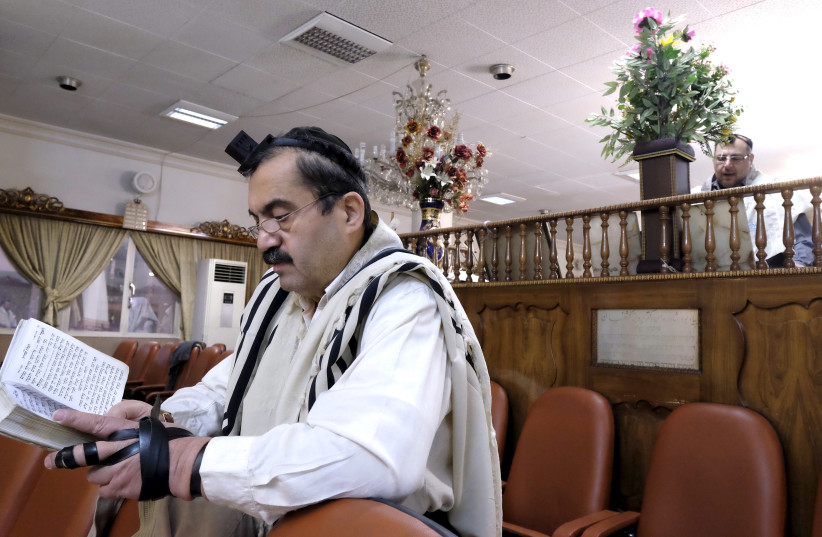Iran’s Jewish community was coerced into voting in the recent presidential elections, an act that the United States deemed “deplorable,” according to an exclusive statement obtained by the Voice of America (VOA) radio broadcast on Sunday.
The coercive measures reportedly included Iranian authorities setting up exclusive polling stations for Jewish voters and arranging an unprecedented event for Jews to meet with representatives of presidential candidates. These actions formed part of a broader effort by the Iranian government to use the Jewish community as a propaganda tool, VOA claimed.
Iran’s Jewish population, which numbers approximately 9,000 out of the country’s nearly 90 million residents according to the latest US State Department report on international religious freedom, has faced discrimination since the 1979 Iranian Revolution when radical Shiite clerics overthrew the government and seized power, the report continued. Since then, VOA alleged, the Jewish community has often been forced to attend anti-Israel demonstrations and rallies in support of the destruction of Israel and are largely considered second-class citizens.
According to the report, the Jewish community was coerced into participating in the presidential election, held in two rounds on June 28 and July 5. On July 6, former Iranian Health Minister Masoud Pezeshkian, a relative moderate and loyalist of the Islamic Republic’s Supreme Leader, Ayatollah Ali Khamenei, was declared the winner. The official turnout for both rounds was under 50%, as most of Iran’s electorate boycotted an election in which only Khamenei loyalists were candidates.
As part of the coercion tactics, Iranian authorities set up exclusive ballot stations for Jews to vote in five Jewish facilities in Tehran, the city that houses most of Iran’s Jewish population, the report said. The Tehran Jewish Committee, an organization representing Jewish interests in the Islamic Republic, announced in a June 20 Telegram post that this was the first time Jews had been allocated special ballot stations for a presidential election. Previously, special ballot stations were set up only for parliamentary elections, where Jews could vote for their community’s sole representative and provincial representative in the Iranian assembly.

“The behavior described in those reports is deplorable,” a spokesperson from the US State Department told VOA. “We never had expectations that Iran’s presidential elections would be free or fair, so these reports of coercion, while awful, are unsurprising.”
Iran’s sole Jewish lawmaker, Homayoon Sameh Yeh Najafabadi, posted photos of himself to Telegram alongside prominent Iranian Rabbi Younes Hamami Lalehzar and other Jews, voting at the Mousa Ben Amran school in the second round of the election on July 5.
The images showed them submitting their ballots into boxes as Muslim staff looked on. “Rabbi Hamami emphasized the necessity for all people, including the Iranian Jewish community, to participate and expressed his wishes for a better Iran and success for the president-elect of the Iranian nation,” the post’s caption read. “Dr. Sameyah also emphasized the maximum participation of the Iranian Jewish community in this election as in the past and thanked the honorable and respectful Iranian Jewish community for their cooperation and participation.”
Under duress
Thamar Gindin, an Iran expert at the Ezri Center of Israel's Haifa University, said to VOA that the Islamic Republic rewards Iranian Jews for their propaganda roles.
Jewish-only ballot stations posed a danger to the community, said Iranian American Jewish activist George Haroonian, as Iranian authorities would have then had access to how many Jews voted, and who they voted for.
In another unprecedented step, on June 26, two days before the election’s first round, a meeting was held at Tehran’s main synagogue of Yousef Abad between presidential candidates’ representatives and Jewish community members. The Tehran Jewish Committee and Najafabadi both encouraged Jewish attendance at the event through messages posted on their Telegram channels on June 23 and 24. However, no photos of the event were published.
Iranian state media also published photographs on July 5 showing Jews smiling for the cameras as they cast their ballots at the Al-Aqsa Mosque in Isfahan. Additionally, they released a video titled “Shiraz Jews at the Polling Stations; A Display of Iranian National Unity,” capturing Jews voting, with two men expressing their loyalty to the Islamic Republic.
“Iran’s Jews are hostages who could be attacked and arrested at any moment and under any pretext,” reminded Haroonian, “Just as the regime does to others whom it wants to intimidate into submission.”
Iran’s U.N. mission responds
Iran’s U.N. mission in New York reacted to the State Department’s comments in a statement sent to VOA on Monday.
“The act of participating in elections is entirely voluntary and open to all walks of life in Iran, with no coercion whatsoever; and there are no repercussions for nonparticipants,” the Iranian statement said. “The participation of Iranian Jews in various elections serves as an indication of their allegiance to their country and the fulfillment of their right to self-determination.”
Rabbi Abraham Cooper of the Simon Wiesenthal Center, a U.S.-based global Jewish human rights organization, responded to the Iranian statement by telling VOA that Many Iranians lack autonomy over their attire and speech. He mentioned that the Iranian government mandates that women and girls of all religions cover their hair in public according to Islamist dress codes, and it often imprisons citizens for peacefully dissenting against Islamist rule.
Regarding Iran's claim that Jews face no consequences for not participating in elections, Cooper said, “You don't need the middle-of-the-night knock at the door to indicate to the Jewish community how they should behave.”
Cooper added that Jewish communities in the diaspora generally follow the Jewish value of abiding by the laws of the land in which they live.
“But make no mistake — the Iranian regime has shown in word and in deed through its proxy forces that it is at war with the Jewish state and people. Iran’s Jews are not fooled for one minute about what the reality is.”
